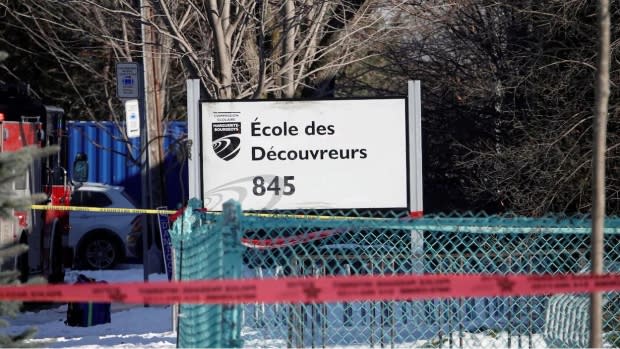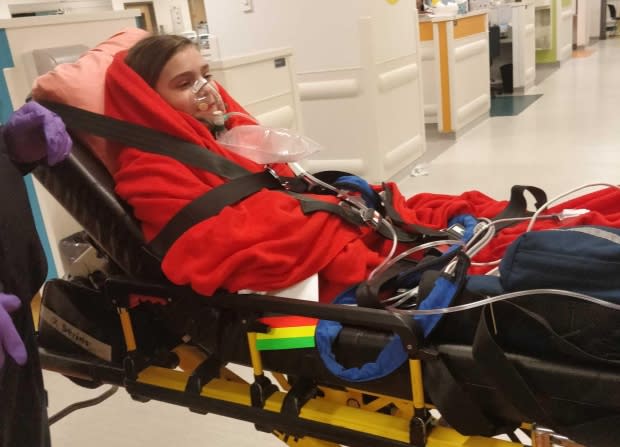Montreal health officials say students need more protection from carbon monoxide
Angelina Sicurella's two children were exposed to carbon monoxide gas in January when the toxic fumes leaked from a faulty heating system at a Montreal elementary school.
Five months later, she told CBC Montreal's Daybreak that her youngest is doing well, but her oldest is struggling in school.
"Her marks have dropped drastically. I've had multiple meetings with teachers. She's fidgety. Loss of concentration. It's like she lost everything. She doesn't feel like she wants to be there anymore," Sicurella said.
She is seeking psychological care for her eight-year-old daughter, Serina Sicurella, who lost consciousness three times at École des Découvreurs on Jan. 14 due to carbon monoxide (CO) poisoning, and ended her day in a hyperbaric chamber at Sacré-Coeur Hospital.
Now Montreal public health officials recommend accelerating the installation of carbon monoxide detectors in schools and to closely monitor those who have been affected by the toxic gas — checking for possible long-term health issues.
The CIUSSS South-Central-Island made the announcement Tuesday in relation to the gas leak that affected some 265 students, as well as employees and teachers.
Education Minister Jean-François Roberge had issued a province-wide directive following the incident making it mandatory for all Quebec schools to have carbon monoxide detectors.
But Montreal health officials want schools to speed up the process, as exposure to the gas can lead to serious health problems, both short and long term, or even death in some cases.
In fact, public health officials have been making these same recommendations to school boards for more than a decade.
"It's important that not only do schools put something in place, but they put in place the things that we know work," Dr. David Kaiser, who speaks for Montreal public health.

The second step is to address anxiety symptoms the young victims may be feeling, he said. Traumatic events can lead to anxiety and that anxiety may worsen when students return to school in the fall.
"And we wanted to flag that now so that the school board, the school and the CIUSSS have in place the services necessary in case that happens," he said.
124 students suffered symptoms
Officials said 124 children suffered symptoms of carbon monoxide poisoning in January. Typical effects of CO poisoning can include headache, fatigue, nausea, vomiting, dizziness, difficulty concentrating and loss of consciousness.
Following the incident, health officials circulated a questionnaire to parents to better assess the effects of intoxication on children.
Of the students affected, more than 20 continued to show symptoms eight weeks after exposure, according to the report released by the health authority Tuesday.

Those students were taken into the care of other doctors and specialists, so public health officials are not aware of their current status, report co-author Maxime Roy said.
Roy, a consulting physician at the public health authority in Montreal, said it is unlikely the students will suffer permanent effects, which typically result from much more serious exposure.
"The vast majority of children will recover," said Roy, noting this return to normal may take some time.
"And in the scientific literature, there are some cases of permanent symptoms, but they were in kids that were almost dead when they showed up in hospital, and that's very different from the kids at this school.''
Students, employees sent to hospital
Thirty-five students and eight school employees at École des Découvreurs were sent to hospital following the leak.
Tuesday's report only discussed the health of the students. A report on the school's employees will be released at a later date.
In total, the report shows some 54 children consulted a doctor and 22 of them then consulted specialists, such as neurologists, audiologists, psychologists, etc. to treat longer-term effects. Those effects include anxiety.
After the school's faulty heating system leaked, the city's fire department said carbon monoxide levels in the hallways of the school were as much as five times the level that usually triggers an evacuation.
In April, the Marguerite-Bourgeoys school board admitted the school lacked detectors, after initially claiming there were enough. Closer inspection of the detectors showed that they were not equipped with working CO sensors.


